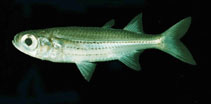| Family: |
Atherinidae (Silversides), subfamily: Atherinomorinae |
| Max. size: |
9 cm SL (male/unsexed) |
| Environment: |
reef-associated; brackish; marine |
| Distribution: |
Western Central Pacific: Philippines and Micronesia to northern Australia and the Solomon Islands. |
| Diagnosis: |
Dorsal spines (total): 5-7; Dorsal soft rays (total): 8-10; Anal spines: 1-1; Anal soft rays: 11-14. Pectoral blotch, when present, distinct; midlateral band silvery (Ref. 9760). Ramus of premaxilla not extending past vertical through anterior border of pupil; Free edge of lower jaw sloping backwards and upwards and with distinct tubercle at posterior end.
Description: Characterized by yellowish brown color dorsally; 12-16 predorsal scales; depth of body about 4.3 in SL; large eye, 2.4 in head length; jaws, vomer and mesopterygoids with small teeth; teeth present or absent on palatines and ectopterygoids (Ref. 90102). |
| Biology: |
Found in shallow coastal waters. Schools with A. lacunosus, A. ogilbyi, Craterocephalus mugiloides, and Hypoatherina temminckii, in the coasts of northern Australia. |
| IUCN Red List Status: |
Not Evaluated (N.E.) Ref. (130435)
|
| Threat to humans: |
harmless |
Source and more info: www.fishbase.org. For personal, classroom, and other internal use only. Not for publication.

